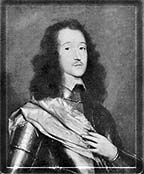 |
   Richard Lovelace was born into an old and wealthy Kentish family in 1618 in Woolwich. He was the eldest son of Sir William Lovelace who had served in the Low Countries and who was killed in action in 1627. He was educated at Charterhouse School and at Gloucester Hall, Oxford. He was attractive, handsome, and witty, the very model of a courtier. His comedy, The Scholar, was acted at Oxford in 1636. King Charles I and Queen Henrietta Maria admired his demeanor so much when they visited Oxford in the same year that they had him created M.A. A key figure at court and close to the king, Lovelace took part in the King's military expeditions to Scotland in 1639-40. After the failure of the campaign he withdrew to his estates in Kent where he remained until 1642. Presumably, Lovelace made Sir John Suckling's acquaintance at this time.
Richard Lovelace was born into an old and wealthy Kentish family in 1618 in Woolwich. He was the eldest son of Sir William Lovelace who had served in the Low Countries and who was killed in action in 1627. He was educated at Charterhouse School and at Gloucester Hall, Oxford. He was attractive, handsome, and witty, the very model of a courtier. His comedy, The Scholar, was acted at Oxford in 1636. King Charles I and Queen Henrietta Maria admired his demeanor so much when they visited Oxford in the same year that they had him created M.A. A key figure at court and close to the king, Lovelace took part in the King's military expeditions to Scotland in 1639-40. After the failure of the campaign he withdrew to his estates in Kent where he remained until 1642. Presumably, Lovelace made Sir John Suckling's acquaintance at this time.In 1642, Lovelace presented a Royalist petition to Parliament favoring the restoration of the Anglican bishops who had been excluded from the Long Parliament [see Kentish Petition]. He thus aligned himself with such royalist upstarts as Sir Edmund Dering (whose petition had already landed him in jail). Lovelace was imprisoned in Westminster Gatehouse from April 30 to June 21, 1642. While in prison, Lovelace wrote "To Althea. From Prison" which includes the famous words: "Stone walls do not a prison make, nor iron bars a cage." Following his release, Lovelace lived briefly in London, after which he removed himself to the Low Countries and France until after King Charles' capture at Oxford in 1646. Lovelace left the field when he was wounded at the battle of Dunkirk. He returned to (Cromwell's) England in 1647. He was committed by Parliament to Peterhouse Prison, Aldersgate in October 1648, probably for his connection with some disturbances in Kent. Released from prison in April 1649, Lovelace published Lucasta. The Lucasta of the poems was Lucy Sacherevell, whom Lovelace liked to call Lux casta. Upon hearing that Lovelace had died of the wounds he received at Dunkirk, she married another. Financially ruined by his support of the royalist cause, Lovelace lived on charity and died in poverty in 1658. He was buried at St. Bride's, one of the churches that burnt down in the Great Fire of London in 1666. Lucasta: Posthume Poems was published the year after Lovelace's death. 
 Lovelace | Works | Links | Essays | Books | 17th C. Eng. Lit.
Site copyright ©1996-2012 Anniina Jokinen. All Rights Reserved. Created by Anniina Jokinen on January 20, 1997. Last updated on May 9, 2012.
|  |
